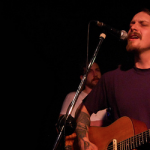story by Derek Munyon | photos by Shannon Claire
The whiskey-infused, punk-inspired harmonic folk of Kill County hovers over Lincoln, Neb., whether the band's members are there or not. There's something captivating about this act that is bringing good old-fashioned, red-blooded, somber country folk back to the indie scene. I was able to talk to one of the members of Kill County, Josh James, about the band and how it ticks.
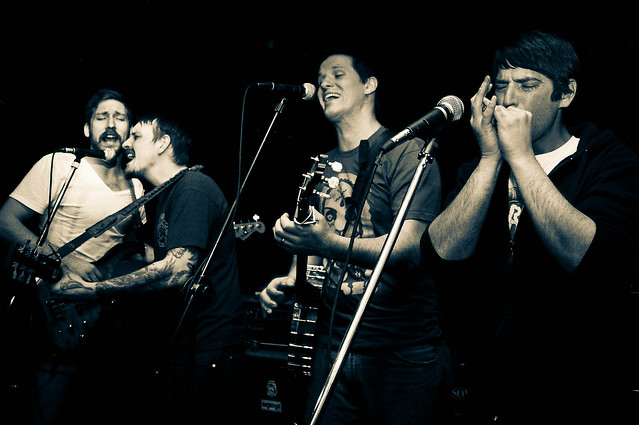
Hear Nebraska: All right, my first question is who is in Kill County and how did the group get started?
Josh James: Kill County started in the winter of 2007. I'd come back to my hometown of Lincoln for the winter in between living in Washington and moving to Alaska. Ringo and I had been playing in a booze-soaked string band called The Red Beer Band before I moved away, and had both been writing a lot in the year I was away.
We got together one night after I got into town and started trading songs. We both really loved what the other was doing and started arranging things right away. I think for the first album and two years or so of playing it was just the two of us, him on banjo and myself on guitar.
The months and dates are a little lost on me, but I moved to Austin, Texas, and he moved to Ames, Iowa. We'd both get together whenever we could to play shows and have our four times a year practice.
In the spring of 2010, we met back in Lincoln again to record our second record, and had a few more close friends record with us. We definitely filled our sound out a little bit with that effort, and realized afterwards that we wanted to do the same thing live. We toured in October of 2010 out to the West Coast with Brad Kindler playing washtub bass, and Joe Salvati playing steel.
We haven't played a show with just the two of us since then. After a few different member changes, the band seems to have settled into a more steady lineup. Jon Augustine on beards and bass, Joe Salvati on dobro, lap steel, harmonica and good looks, Brad Kindler, who currently lives in Africa, on drums, and Ringo and myself on the whiskey bottle.
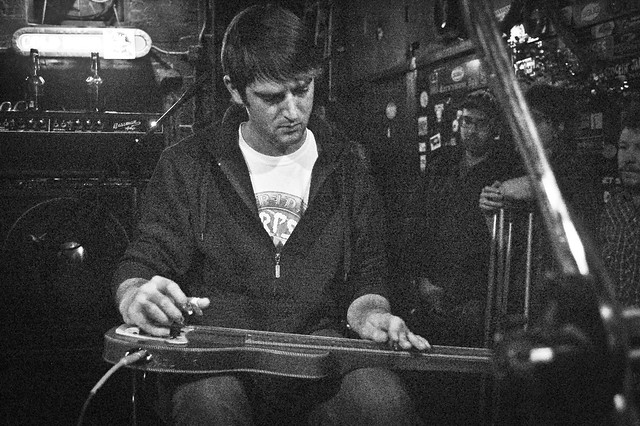
HN: It really is impressive how well you are able to make it work. What inspires you lyrically?
JJ: Ringo and I both grew up listening to and playing in punk bands. A lot of those ethos still make sense to us. You know, when you're young and pissed off, that music strikes a chord, gives you ownership of those feelings.
I started listening to a lot more country and folk music about 10 years ago, and it didn't take long to realize that the lyrics and emotions in those songs had the same substance as the punk music I'd grown up on. Maybe it was played with a bit more finesse, or a little more melancholic, not as aggressive, but it was the same stuff: heartache, poverty, disenfranchisement, anger; it's all in there.
Shit, there's no denying that Woody Guthrie was punk as fuck. I don't think we're going out on too many limbs lyrically. I know we both focus on lyrics and try to craft them as best we can. We both enjoy using imagery, some ambiguity, some double entendre.
As far as the content, I think we both generally write from a pretty dark place, and maybe that's our musical upbringing coming through. For me, sad songs aren't depressing, they usually have the opposite affect. They're reassuring and comforting, knowing that someone else has shared your same experience.
A lot of our songs are autobiographical, but just as many are narratives about another person, some real people, some fictional. Sometimes those fictional narratives have a lot to do with something we've been through, but written from the place of another.
I think empathy is important in songwriting. Without it, it's too easy to become narcissistic in your storyline, or to not really understand the emotion or situation you're trying to write about. In general, our themes are things like hard times, inebriation of all kinds, friendship, takin' your job and shovin' it, heartache, poverty, solidarity, trucks, trains, and the Midwest.
Growing up on the plains is something unique. Appreciating the quiet and the vastness of it makes people a bit different, and I think that comes through in our music. Also, we've come to realize that there's a lot of geography in our songs. That may have something to do with the distances between us, and the traveling we've done for the band and otherwise.
HN: You mentioned how similar folk and punk are to one another. What really finalized your shift from the one to the other?
JJ: I mean, I still love and play heavy music. Besides a lot of acoustic and folk stuff, I listen to a lot of metal and grindcore and whatnot. I'm working on a project right now with some friends in Austin that's heavy and loud, and a lot different than the Kill County stuff.
My main priority is Kill County, but I need to play the heavy shit as well. There's an element there that I can't really get playing acoustic music. When I moved to the Northwest in 2007, I sold all my gear except my acoustic, and I guess by necessity started writing way more acoustic music. It took me a long time to understand how to fill out the sound with just an acoustic and my voice in the room, without other instruments and lots of volume.
Now I understand that sometimes less is more, and that the breath and space in between notes is an instrument in and of itself. Hearing Ringo play was integral in realizing that. I'm always impressed at how big he can make a banjo and his voice sound. There's a gravity and a weight to that sound that's heavy in its own right, you know? So I guess we've haven't necessarily shifted from one to the other, but rather use the two to influence one another.

HN: Your punk past seems to be a major influence. What groups have influenced you?
JJ: When I was really young I liked a lot of East Coast crust stuff like Aus-Rotten and the Pist, some thrash, D beat stuff like Skitsystem. His Hero is Gone's Monument to Thieves was my favorite record when I was 16. I was and still am a huge Avail fan. Those guys know how to be a working band, and they're genuine dudes.
Hot Water Music was an important band at the time for me, and I think the Chuck Ragan solo stuff is pretty damn good as well. Last Kill County tour we had a Bad Brains tape that got a lot of play. In my opinion, punk music is in shit shape at this point. I think the ethos have survived, but maybe they're being expressed in other types of music, like country or folk.
Lately, I've been listening to Angels of Light and the Nick Cave and Warren Ellis collaborations. As far as bands that influence Kill County, that's hard to answer. For me, a lot of old folk music traditionals and Earth, with some Mississippi John Hurt thrown in. Ringo and I have both been listening to a lot of the Wooden Wand stuff also.
I think our approach to Kill County is hopefully a little different than the way other musicians approach acoustic music. We're blessed to have a guy like Joe Salvati in the band, who is a fucking phenomenal dobro and steel player, and can write really original lead parts.
But just as often, and something we tried to do a lot of on our new record, we try to focus on tone and creating a aural landscape that fits the song. Something sparse that sits back in the mix, and fills out or leans in on a certain part. Jon and I especially both listen to a lot of ambient and heavy music, so we bring that to the table.
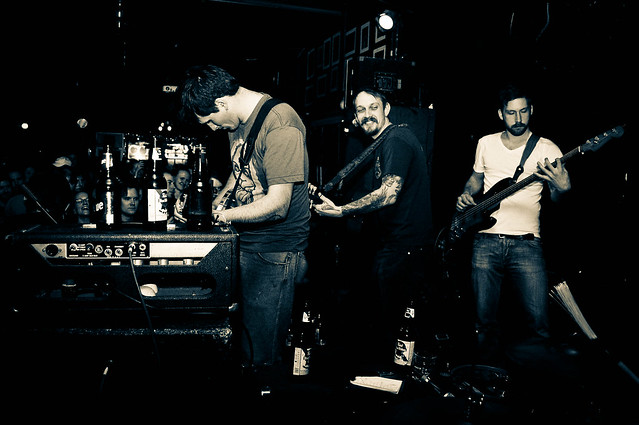
HN: You guys are scattered all over. What brings you back to Nebraska as your home base?
JJ: We all grew up there, and Joe and Jon still live in Lincoln. We have a history there, people come out and show support when we play in town. At this point, there's a nostalgia involved with Lincoln also, at least for me.
Going back usually means that Kill County is playing or recording, which is something I look forward to whenever it's not actually happening. Everything we've recorded, including the album we just did in February, was done in someone's house in Lincoln. And beyond all that, I love that town.
HN: What's the story behind the name Kill County?
JJ: We never have a good answer to that. I'm not sure. I think I thought of it a long time ago when I started writing acoustic songs. I probably brought it up when Ringo and I started writing together and it stuck.
We both hate naming songs, albums and especially bands. It's hard to find a cohesive name that sums up what a band encapsulates and represents. I think of Kill County as a fictional place, somewhere in between the distance between our bandmates.
I guess it sounds somewhat violent, and I think there's a lot of violence in our music, at least lyrically. Maybe not so much on a physical level, but emotionally, economically, it's violent music. Violence hurts, heartache hurts, heartache is violent.
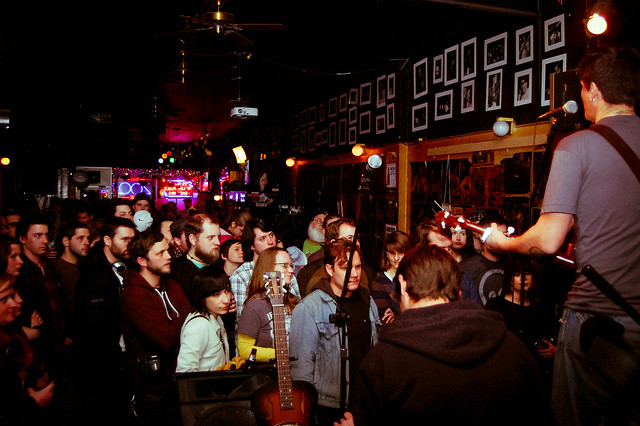
HN: If you could collaborate with anyone, who would it be?
JJ: Shit, man I don't know. Waylon's dead. I think getting to work with someone like Warren Ellis would be awesome. We've played with our friends in Busgas before, and have a project with them on the back burner. Group Bombino featuring KC would be the shit.
There's plenty of people we'd love to sing harmony with or backup, that's a long list. Catherine Irwin, Iris Dement, John Prine… but as far as writing with, I don't know. I think the more out of left field the better, some amplifier worship band. Someone with gear we can't afford.
HN: More out of left field the better? What about someone on Top 40 radio?
JJ: I'm not sure who's on the radio these days, but no, I don't think that would work. We record on a four-track. I think there has to be a depth missing in your music to appeal to enough people to make top 40.
HN: Fair. As an acoustic musician and a former punk musician, would you say lyrics are more important than instrumentals?
JJ: I don't think one is more important than the other. If you've got brilliant lyrics but the melody is boring or your guitar line is weak, then those lyrics don't count for much, in my opinion. You might as well write poetry.
On the other hand, your band might blow me away, but if your lyrics are trite or unimaginative, I'll probably change the record. I always read lyric sheets. I always did growing up on metal and punk, out of necessity, and I still do.
My favorite country songwriters are the ones with proper lyrics: Blaze Foley, John Prine, Townes, Waylon, Hank, Jon Wayne, those guys can all write really well, and they all have great arrangements. It's hard to have one without the other.
HN: Who are some of the most promising local bands you've come in contact with?
JJ: It's hard not living in Lincoln. I know we're missing out on a lot of great local music. We've played some shows in Omaha with McCarthy Trenching, and I love Dan McCarthy's approach to writing. I've been listening to his new record a lot lately.
Busgas in Lincoln is the shit, as well as Masses, which might be uncouth of me to prop them seeing as how Jon's in both those bands, but I don't care. Both bands are innovative and unique, and those Masses boys are shredders. That's the great thing about Lincoln, it's big enough to support a vibrant music scene, but small enough that you get called out full of shit real quick if you're trying to do something derivative.
HN: I had always heard that Lincoln has a hard time getting the college students to support their music scene. With so many bands and such a vibrant scene, why do you think that is?
JJ: I don't know that that's completely true. I think the proximity of UNL to the downtown venues makes it seem like they're not supporting it, because in Lincoln, the majority of the bars are in a six-block area. There's not a separate college bar area or too many venues outside of those six blocks.
I'd say there are plenty of students playing music and supporting it, and there are even more who would rather listen to pop radio and drink fishbowls, but with the way the bars and venues are arranged, it all takes place in the same area.
HN: Do you think there is anything the scene could do to convert those who would rather listen to pop radio?
JJ: I don't think you can give someone good taste. I think that as far as popular music is concerned, the audience is so far removed from the person performing, and the performer is so far removed from the reactions and feelings of the audience, that it becomes a sterile, inert experience for everyone.
The feeling you get watching a good band on a small stage in a shitty dive bar is incomparable. The more people that understand the value in that, the better, and in today's musical climate, that's where a lot of the good, working bands are: in shitty dive bars.
HN: Very true. What are some of your favorite venues to play?
JJ: The sound at Duffy's is awesome, and we seem to draw well there. Dub has always treated us well. Everyone at The Zoo Bar has been great to us as well. That's really the only bars we play in Lincoln. Trophy's in Austin has given us some epic shows in the past. And anyone's basement, anytime.
HN: What are your top five albums of all time?
JJ: That's an impossible question to answer. I don't think I can speak for the rest of the guys on that one. We could potentially argue over that for years. I'd inevitably name a metal album, and Ringo's metallergic.
HN: What other projects do your members have going outside of Kill County?
JJ: Ringo's been doing some solo shows up in Ann Arbor. He just played at a local radio station up there last Saturday. I've been playing with Headdress down here in Austin, and working on some new stuff with some friends down here.
My wife Anna and I have a country band down here as well called Hard Luck Down. We're on a bit of a break right now. Our stand up bass player Bryan Bussard, who mixed the last record and who helped engineer and is mixing the new one, moved back to Lincoln.
Jon plays in Masses and Busgas in Lincoln. Joe's not really playing with anyone else right now. He writes a lot, too, and is a hell of a guitar player, so I think he's been working on his own stuff. That dude gets better every time we're back in town. I haven't heard from Brad since he left, but if I know him, he's playing with someone in Malawi.
HN: If it's not too much to ask, why did Brad go to Malawi?
JJ: I can't speak for Brad, but I do know that everyone at some point feels a need to leave their hometown. Some people ignore it, others chase it and are usually better for it. I think it was his time to go, and the Peace Corps was the way that felt right to him.

HN: How do you balance your band with the other aspects of your life?
JJ: Shit, man, what other aspects? I don't know, I'm lucky to have a wife who is supportive and encouraging, and can put up with me being gone for weeks at a time. I work for myself as a carpenter and can pick up and leave anytime I want. I've always structured my life to work around music and bands. Shit, I've got it made. Ringo is able to work from just about anywhere also, so it all works out.
HN: Sounds like a good life. What advice could you give to other bands just getting started?
JJ: Don't worry so much about shows. Just practice, all the time, as much as you can. That's the fun part. If what you're doing is important to you and is honest music, people will notice, and shows will happen.
Save your money for better instruments, they make you a better musician. Tour is not vacation, don't bitch when things go wrong, because they will. Don't pay yourselves off of your shows, unless you're making serious loot. Save that shit in a band fund, you'll need it.
Don't worry about work or making a living; you're a musician, you're supposed to be poor, and you'll get used to it. Music is the most important, be ready to trade a lot of things you want, whether they're material things or relationships, to be able to play and tour.
Don't buy a tiny car if your band has a lot of gear, that's a dick move. Buy a van and ride a bike. Before you leave for any type of tour, if you're anything like Kill County, spend a week going on a serious bender. You can't jump into tour having taken care of yourself the week before, you won't last, your blood will be too clean. Stay thoroughly pickled before, during, and for a good week after tour.
Oh, and be hard on yourself and criticize the music you're making all the time. That way you only keep the good stuff. Love what you do.
Derek Munyon runs the We Are All Portals blog, which is also on Facebook, Twitter and Tumblr. This interview was conducted over email in April.




